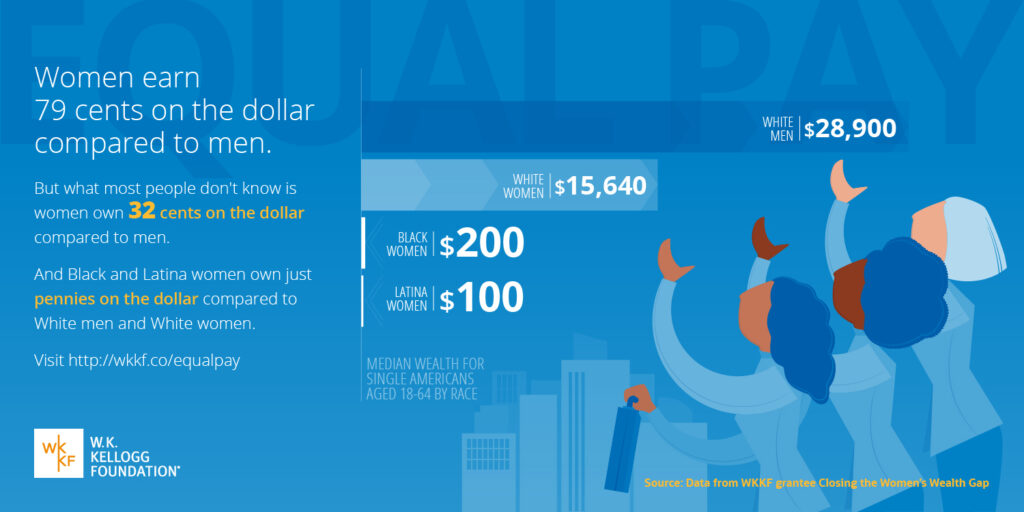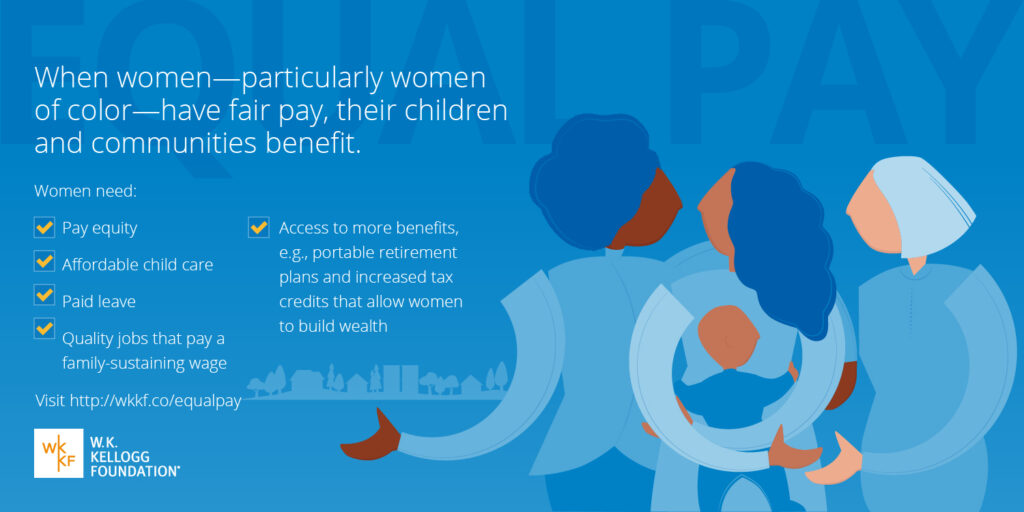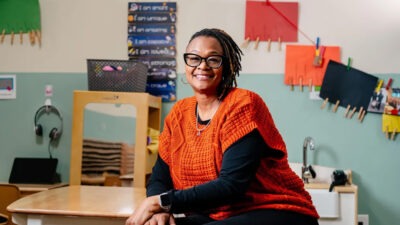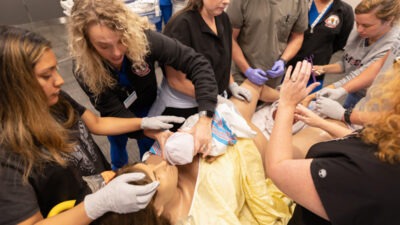The pay gap between men and women is common knowledge. Yet, most people don’t know that wealth disparities between men and women—particularly women of color— are even more stark. When we compare for wealth, women own 32 cents on the dollar compared to men. And Black and Latina women own just pennies on the dollar compared to White men and White women, according to WKKF grantee Closing the Women’s Wealth Gap.
Wealth is a measure of financial security and independence. Savings, investments, home or business ownership—all things that allow families to weather downturns and provide economic stability that also can be passed to the next generation—determine wealth.
“... women’s ability to earn, save and invest plays a critical role in the well-being of their children, the strength of their communities and the economic prosperity of our nation.
Heather McCulloch, Founder and Executive Director at Closing the Women’s Wealth Gap Tweet
Women of color disproportionately work in low-wage jobs that create instability because of poor pay, unpredictable work schedules and minimal benefits. “… women’s ability to earn, save and invest plays a critical role in the well-being of their children, the strength of their communities and the economic prosperity of our nation. Yet, today, private sector practices, public systems and policy barriers are limiting the capacity of women—and especially women of color—to reach their full economic potential,” writes Director Heather McCulloch from Closing the Women’s Wealth Gap.

As communities of color continue to bear the brunt of pandemic racial inequities, women’s economic security is even more at risk. According to WKKF grantee Equal Rights Advocates, last year, 55% of Black women reported having less than $200 in savings to help cover basic needs during the COVID-19 crisis compared to 37% of White women and 27% of White men. And while the American economy is slowly recovering, Black and Latina women are being left behind. According to Bureau of Labor Statistics data, February 2021 total employment for Black women was 9.7% lower than it was a year prior in February 2020, before COVID-19 hit the U.S., with that figure for Latina women close behind at 8.6% lower. Employment was also down in that same time period for White men (5%), White women (5.4%) and Black men (5.9%).
“The pandemic makes strong fair pay policies more critical than ever to Black, Latina, Native American and working moms everywhere. When these women have stronger fair pay, their children and communities benefit.”
Shannon Williams, director of Equal Pay Today at Equal Rights Advocates
Yet, there are solutions.
A cadre of grantees focus on ensuring that the work and the economic contributions of women of color are valued and paid fairly in all occupations and industries. Their efforts include:
- Increasing workforce development and career pathways through public and private partnerships and employer engagement;
- Expanding support for Tribal, entrepreneurs of color and women-owned business enterprises to accelerate business—and small business—growth;
- Increasing economic security with access to savings, assets development and just financial services;
- Increasing access to equitable early learning opportunities—including child care—that provide whole child development and meet families’ needs; and
- Promoting long-term policy and system change for quality employment and wealth building opportunities.
For children to thrive, their families must be stable. Their parents and caregivers—especially mothers— must have access to quality jobs that pay a family-sustaining wage, offer benefits allowing women to build wealth and give them flexibility to be full and active participants in their child’s life.

WKKF Grantees Working for Change
CPD and its affiliates are at the forefront of the movement for economic justice to raise workplace standards that mobilize marginalized groups to demand policy solutions that promote equity. One of its current initiatives helps unemployed workers affected by COVID-19 access unemployment insurance (UI) and other benefits provided by the various relief packages, while increasing the base of affected workers engaged in organizing and advocacy efforts. CPD also elevates failures in the UI system and proposes improvements from the perspective of affected workers.
Early educators are among the most underpaid workforces in every state. But with meaningful reforms and investments, early education jobs can provide women, especially women of color, with stable, middle-class employment. The center is studying four major areas of work, all focused on policy, systems and narrative change. Based on the research outcomes, the center works with partners to improve the economic circumstances and conditions of early educators – the lives of their own children, as well as those they care for every day.
Women are significantly underrepresented in high-wage skilled construction trades, which contributes to a wider wage gap between Black and Latina women and White women. To create career pathways for women, Chicago Women in Trades supports women-only, pre-apprenticeship programs – convening industry, labor and workforce development partners in curriculum design and program participant identification. The initiative provides support and leadership development opportunities for tradeswomen and advocates for policies and practices that increase entry and retention in the field, while advancing guidelines on women-specific issues such as family and caregiving leave and pregnancy accommodation.
The women’s wealth gap is even more stark than the more well-known women’s wage gap. Closing the Women’s Wealth Gap is a national initiative that includes a broad cross-section of stakeholders from the nonprofit, public and private sectors that are committed to lifting the intersections of racial and gender wealth disparities. CWWG shares personal stories of how women and their families are harmed by the wealth gap and mobilizes private sector champions to inspire action among their peers.
ERA conducts community-based research to listen to the experiences of Black and Latinx family breadwinners to understand the status of women, families and children of color. This research is being used to develop community-informed and community-led policy advocacy to: expand access to early childhood education and affordable child care; support safe and affirming school environments; provide job security and income equality; and foster workplace-related improvements such as advancement opportunities for women of color with children, paid leave and sick time.
GWC, a worker rights organization, leads an anti-sweatshop movement by advocating on behalf of garment workers in Los Angeles, largely made up of immigrants who face harsh and unsafe working conditions. Through strategies from safety and know-your-rights trainings to legal support in wage and other labor disputes, GWC advocates to end the conditions that exploit workers, such as eliminating the piece-rate system that pays workers per piece instead of an hourly wage. The organization also works with ethical brands and employers to decrease wage theft and create healthier and safer working conditions.
Black women disproportionately work in low-wage jobs, a reality upheld by narratives, policies and programs that steer women of color toward some occupations while blocking access to others. To break this cycle, the Insight Center is conducting analyses in two cities to understand how Black women are positioned in the labor market and industry, and highlighting who is most impacted by the economic slowdown caused by COVID-19.
Far too few women, especially women of color, are employed in high-wage skilled construction trades and manufacturing, and instead make up a majority of workers in low-wage service sector jobs. IWPR surveys women in skilled construction trades and manufacturing to understand the opportunities and barriers in these industries. Based on the findings, IWPR is creating two reports with recommendations for labor, contractors, workforce development practitioners and policymakers, including best practices, to share through IWPR’s extensive network. By increasing industry awareness, IWPR strengthens the capacity of organizations supporting women in these fields and improving pathways for women entering skilled trades.
Domestic workers, who are largely people of color or immigrants, many of them undocumented, don’t have access to standard wages, benefits or workplace protections. Through organizing, policy advocacy and enforcement, as well as the creation of tools and products to protect rights and benefits, NDWA implements and enforces domestic worker protection policies. NDWA also works to increase enrollment on Alia, a portable benefits platform for 10,000 domestic workers, and elevate supportive narratives of domestic workers.
Too many women, especially women of color, work in the growing number of jobs that create instability because of poor pay, unpredictable work schedules and minimal benefits. In addition, paying for high-quality child care is a significant challenge. Child care providers who prepare children for the future while their parents earn a living, also deserve fair pay and good working conditions. NWLC works with both labor and child care advocates to inform policies at state and federal levels that support women working in low-wage jobs and their children.
As a growing number of direct-care workers struggle to make ends meet, PHI supports the direct-care workforce through research, policy advocacy and technical assistance. To improve job quality, economic opportunity and respect for direct-care workers, PHI works with key organizations to strengthen relationships and build capacity among state and local organizations.
PWF works with affiliates to address inequities that disproportionately impact low-income neighborhoods, communities of color and women. With employment equity and job quality as primary goals, PWF builds and expands coalitions and partnerships, nurturing a pipeline of new leaders, developing key resources to influence and impact employment equity and advocating for changes in policy and industry practices, while also improving labor standards and worker protections. Increasing income and benefits, such as paid time off for low-income parents, helps lift families and children out of poverty.
Polaris is transforming the agricultural labor landscape so workers are fairly recruited and empowered to choose good employers, and abusive companies are held accountable for exploitation. Polaris runs the U.S. National Human Trafficking Hotline and finds that most reports come from workers under the H-2A visa program, which ties worker status, housing and transportation to a single employer. Polaris works with immigration and worker advocates to collect first-hand accounts on worker experiences in the recruitment process and working conditions, raise awareness of rights and avenues for recourse along the labor supply chain and reform the tied visa system to improve working conditions.
Retail is the largest employer of low-wage workers with roughly 16 million workers struggling to earn a living wage due to contract, temporary or part-time jobs. United for Respect engages a network of retail workers and other stakeholders in developing public, industry, sector, corporate and investor policies, as well as coalition and capacity building for partners. For example, United for Respect assists with outreach and education to maximize participation in a historic hardship fund for displaced Toys“R”Us employees – already having moved two of the company’s private equity owners, KKR and Bain Capital, to contribute to a private relief fund for the laid-off workforce.
WLF mentors and helps low-income, single mothers establish and expand their businesses through financial education and entrepreneurial empowerment, using new technology to provide learning opportunities that don’t require major financial investments or lengthy time commitments. WLF pairs high-net-worth women with program participants of color to provide entrepreneurship mentoring and expertise. This includes small-business development, introduction to market access, federal contracting and supplier diversity – lifting fledgling businesses up to become potential job creators while increasing income for women of color.








Comments